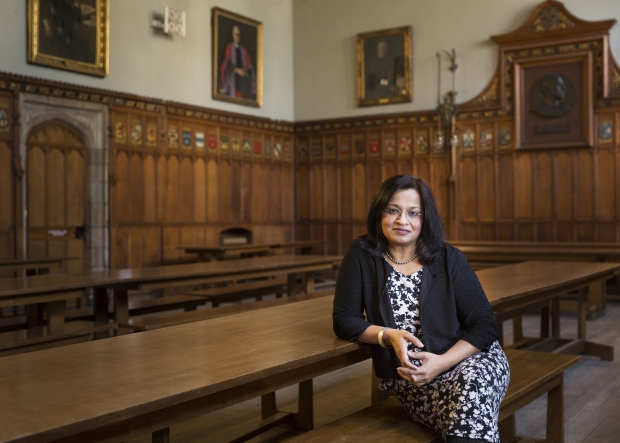Register civil marriage at same time as Muslim ceremony, review says

A major independent review into the application of Sharia law in England and Wales has proposed legislative changes to overhaul Muslim marriage.
The report proposes that Muslim couples conduct a civil marriage at the same time they undergo an Islamic one, giving women protection under the law should they seek divorce.
It also calls for an awareness campaign so that Muslim communities understand women’s rights in civil law, especially in areas of marriage and divorce.
“By linking Islamic marriage to civil marriage it ensures that a greater number of women will have the full protection afforded to them in family law and they will face less discriminatory practices,” the report said.
“This will be a positive move aimed at giving women maximum rights should the marriage end in divorce.”
Some Muslim couples choose to take religious vows without legally registering their marriage.
Reasons for this include a lack of awareness that Islamic marriages need to be registered separately to be legal or the belief that should the couple divorce, one partner may lose out financially in civil divorce proceedings.
While Islam permits the husband to divorce unilaterally, a wife must rely on her husband’s consent to divorce, or ask a Muslim jurist to dissolve the marriage.
This had led to the growth of so-called Sharia councils throughout the UK, which do not exercise any legal power under English law, but have the religious authority to permit divorce.
Sharia law
Sharia law refers to the religious precepts of Islam as derived from the Quran and Islamic traditions known as the Hadith.
Yet the term has become increasingly politicised in recent years.
In 2008, the Archbishop of Canterbury Rowan Williams sparked controversy when he said that the adoption of some of its aspects seemed “unavoidable”.
Later that year, Lord Phillips, the most senior judge in England and Wales, said that the principles of Sharia law could play a role in some parts of the legal system.
Some campaigners have said Sharia discriminates against women and that the existence of councils forms part of a "parallel legal system", calling for Muslim marriage and Sharia councils to be scrapped altogether.
“Muslim marriages are not going to go away,“ said the report’s lead author, Professor Mona Siddiqui, an authority on religion and ethics based at the University of Edinburgh. “Muslim women want the religious marriage.”
'The women go because they say they need a piece of paper to clear their conscience'
- Professor Mona Siddiqui, lead report author
Siddiqui, along with a panel that included a former judge and two lawyers, collected evidence from women who had used Sharia councils as well as a number of women’s groups.
Speaking to MEE, Siddiqui said that Muslim jurists she spoke to “recognise a civil divorce is tantamount to an Islamic one”.
“The women go because they say they need a piece of paper to clear their conscience. The councils only exist because there’s a need for it. If you ban them, they would simply go underground.”
State regulation
The report does not shy away from criticising the councils. “From those who gave evidence to the review panel, no one disputed that Sharia councils engage in practices which are discriminatory to women," the report says.
It highlights that there are few women members of Sharia panels, even though 90 percent of those who attend them are women seeking divorce, and sometimes the process involves a lengthy process that often includes personal details of their relationship.
Siddiqui said that registering all Muslim marriages under civil law and increasing awareness about women’s rights would reduce the need for Sharia councils.
But in the meantime, the report recommends that the British government create a body to regulate Sharia councils and introduce a code of practice.
A dissenting view on the panel warned against state regulation, arguing that it could send a message that “certain groups have separate and distinct needs and further that Sharia councils are an appropriate forum for resolution of their family law disputes”.
“In short it would perpetuate the myth of separateness of certain groups.”
Jewish Beth Din councils and Catholic tribunals, which deal with divorce and marriage annulment respectively, are not state-regulated.
But Siddiqui defended the need for regulation, arguing that it would defend women’s rights.
“The dilemma we faced is that if we don’t do anything, and there is clearly a problem, then Muslim women aren’t protected. You do something and it's seen as though you’re creating a system. The Muslim women we spoke to want regulation.”
'I don’t think they will. This is not about Muslims versus anyone. This is about what is best for Muslims communities in the long term'
- Professor Mona Siddiqui, lead report author
Responding to concerns that state regulation might be rejected by parts of the community, Siddiqui said: “I don’t think they will. This is not about Muslims versus anyone. This is about what is best for Muslim communities in the long term.”
Siddiqui added that singling out Sharia councils for regulation should not be viewed as discriminatory and that the focus should be on improving them.
“There are more structures in place in Jewish Beth Dins and tribunals - it’s more formalised,” she said.
“We need to look at when things aren’t right in our communities and rectify them.”
Stay informed with MEE's newsletters
Sign up to get the latest alerts, insights and analysis, starting with Turkey Unpacked
Middle East Eye delivers independent and unrivalled coverage and analysis of the Middle East, North Africa and beyond. To learn more about republishing this content and the associated fees, please fill out this form. More about MEE can be found here.






